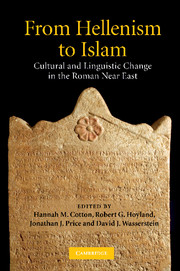Book contents
- Frontmatter
- Contents
- List of figures
- List of tables
- List of contributors
- Preface
- List of abbreviations
- Introduction: documentary evidence, social realities and the history of language
- Part I THE LANGUAGE OF POWER: LATIN IN THE ROMAN NEAR EAST
- Part II SOCIAL AND LEGAL INSTITUTIONS AS REFLECTED IN THE DOCUMENTARY EVIDENCE
- Part III THE EPIGRAPHIC LANGUAGE OF RELIGION
- Part IV LINGUISTIC METAMORPHOSES AND CONTINUITY OF CULTURES
- Part V GREEK INTO ARABIC
- Index
Preface
Published online by Cambridge University Press: 01 March 2010
- Frontmatter
- Contents
- List of figures
- List of tables
- List of contributors
- Preface
- List of abbreviations
- Introduction: documentary evidence, social realities and the history of language
- Part I THE LANGUAGE OF POWER: LATIN IN THE ROMAN NEAR EAST
- Part II SOCIAL AND LEGAL INSTITUTIONS AS REFLECTED IN THE DOCUMENTARY EVIDENCE
- Part III THE EPIGRAPHIC LANGUAGE OF RELIGION
- Part IV LINGUISTIC METAMORPHOSES AND CONTINUITY OF CULTURES
- Part V GREEK INTO ARABIC
- Index
Summary
This book is devoted to processes of continuity and change over the thousand years which separate Alexander the Great from Muhammad the Prophet – two men perceived as instrumental in changing the linguistic and cultural map of the Middle East, the former responsible for the spread of Greek, the latter for the demise of Greek and the rise of Arabic. Obviously the reality is not so simple, and the main purpose of this book is to examine the finer details and complexities of the relationship between languages and cultures during this period, and also to offer some account of the variety of responses that Greek, and other languages, evoked in the peoples of that area from Greece (and Rome) eastwards to Iran.
Like many other collective works, this book too has its own history. It grew out of the success of a conference, and the conference itself out of the experience of the editors as leaders and participants in a yearlong research group at the Institute for Advanced Studies at the Hebrew University of Jerusalem in 2002–3. The group was led by Hannah M. Cotton (of the Hebrew University of Jerusalem), Jonathan J. Price (of Tel Aviv University) and David J. Wasserstein (then of Tel Aviv University, now of Vanderbilt University); the other members were Leah Di Segni and Shlomo Naeh (of the Hebrew University of Jerusalem), Robert G. Hoyland (then of Oxford University, now of the University of St Andrews), E. Axel Knauf (of Bern University), Marijana Ricl (of the University of Belgrade) and Seth Schwartz (of the Jewish Theological Seminary in New York).
- Type
- Chapter
- Information
- From Hellenism to IslamCultural and Linguistic Change in the Roman Near East, pp. xiv - xxPublisher: Cambridge University PressPrint publication year: 2009



